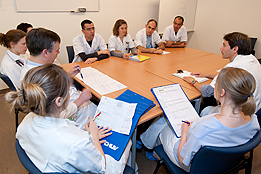Transplant infectious disease

Clinical research in transplant infectious diseases
The field of transplant infectious diseases has greatly evolved over the last years. New potent immunosuppressive agents have reduced the risk of rejection, but at the price of increasing the potential risk for infectious complications. This problem has fostered the prescription of routine antimicrobial prophylaxis in most of the patients. As a consequence, a modification in the pattern of known infections or the appearance of new pathogens has been observed recently. Among several challenge in the management of infection in transplant recipients are the prevention of viral infections, such as cytomegalovirus and influenza.
Cytomegalovirus (CMV) is a major viral pathogen after organ transplantation. Significant improvements in the prevention and treatment of CMV infection and disease have led to a considerable reduction in CMV-associated morbidity. Despite these advances, CMV disease appearing after the discontinuation of antiviral prophylaxis is relatively common and may be associated with morbidity after transplant. The reduction in the incidence of late-onset CMV disease is a major challenge in the management of solid-organ transplant (SOT) recipients.
Vaccination remains an essential strategy for preventing infection in SOT recipients. Overall, immunogenicity of vaccines is reduced after organ transplantation. Therefore, novel strategies of vaccination are highly needed to protect SOT recipients from preventable infections, namely influenza, Streptococcuspneumoniae and varicella-zoster virus.
Our program of clinical research will also take part in the Swiss Transplant Cohort Study (STCS), which is a nation-wide prospective multi-site cohort study funded by the Swiss National Science Foundation that was initiated in May 2008. The STCS has set up a prospective clinical database and biobank of Swiss transplant recipients and it is currently an outstanding tool for performing multicenter studies in the field of transplantation.
Swiss Transplant Cohort Study
Our clinical research program participates in the Swiss Transplant Cohort Study (STCS), which is a nation-wide prospective multi-site cohort study funded by the Swiss National Science Foundation and which started in May 2008.
The STCS has set up a prospective clinical database and a biobank of Swiss transplant recipients. The STCS offers a remarkable tool for performing and managing multicenter studies in the field of transplantation.
Main research topics
Prevention against the cytomegalovirus disease
- Usefulness of the measurement of cell-mediated immunity against CMV in the prediction of CMV disease in high-risk solid-organ transplant recipients
- Assessment of the impact of the prevention strategies against CMV on allograft outcomes
- Assessment of the role of Pattern Recognition Receptors polymorphisms in the incidence of infection (particularly CMV) after organ transplantation.
Vaccination in solid-organ transplant recipients
- Identification of humoral and cell-mediated markers of influenza vaccine response in SOT recipients
- Improving immunogenicity of influenza vaccine in SOT recipients
- Assessment of safety of influenza in SOT recipients
Contacts
CHUV
Centre de Transplantation d'organes
BH10/549
Rue du Bugnon 46
1011 Lausanne, Suisse



